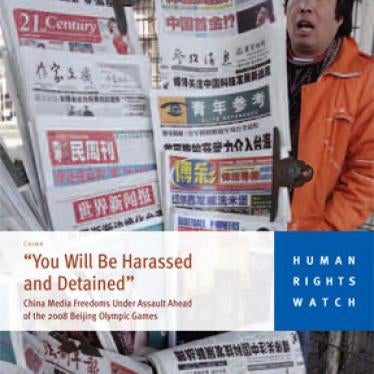(New York) - The Chinese government’s announced crackdown on “false news” and “illegal news coverage” could be yet another direct threat to media freedom in China, Human Rights Watch said today.
The crackdown adds to the Chinese government’s existing arsenal of vaguely-worded prohibitions, such as laws against “spreading rumors,” which help stifle independent reporting through the threat of serious legal repercussions. The tightening of the government’s stranglehold on the country’s media ahead of the 17th Congress of the Chinese Communist Party in October puts at risk journalists whose reporting runs counter to official propaganda.
“This crackdown is a legal gun to the head to responsible journalists who want to report on the basis of facts,” said Sophie Richardson, deputy Asia director at Human Rights Watch. “China has a long track record of using similar campaigns to weed out news that the authorities find objectionable because it exposes social and political problems.”
Human Rights Watch said the latest media tightening reflects the efforts of the Chinese government to purge China’s media of embarrassing reports of scandal, disaster and official malfeasance ahead of the Party Congress. The Congress, which is only held once every five years, will unveil the next generation of China’s Communist Party leadership.
The Chinese government announced the crackdown on August 15 through state media and an official website and said it would encourage “a healthy and harmonious environment for a successful 17th Party Congress” by stamping out “illegal news coverage” and “false news,” according to Liu Bingle, director of China’s official General Administration of Press and Publications. On the same day, Xinhuanet described the campaign as necessary “to maintain the credibility of the mass media and to safeguard the public interest.”
Fake news reports and individuals who impersonate journalists are a legitimate, widespread problem in China. A lack of training in journalistic ethics and a national media that has served as a tool of the Chinese Communist Party rather than a purveyor of objective news and analysis have laid the groundwork for the production of false news reports. In addition, relatively low-paid Chinese journalists are often bribed to cover particular stories, a practice that now prompts non-credentialed individuals to falsely claim to be journalists in order to receive those same financial benefits.
“Fake journalism erodes confidence in the media anywhere it occurs, but China’s government inflicts far more serious damage on public perceptions of the media through heavy-handed control of content and widespread censorship,” said Richardson.
Chinese journalists already face tight constraints on reporting freedom, ranging from a regularly updated list of forbidden topics issued by the government’s Publicity Department (formerly called the Propaganda Department in English) to financial incentives for adhering to the Chinese Communist Party line on what and how news can be reported.
Chinese journalists are also subject to penalties ranging from dismissal to prosecution for violating vaguely-worded regulations against “spreading rumors” or violation of “news discipline,” which can be subject to arbitrary interpretation by police and the judiciary.
In November 2000, three journalists from the state-owned Lanzhou Ribao and Lanzhou Wanbao in Gansu province were either fired or demoted for having violated “news discipline” after reporting the explosion of a military truck in Xinjiang region. In January 2003, Wang Daqi, editor of the magazine Ecology, was jailed for one year for “incitement to overthrown the government” for publishing articles about the Cultural Revolution. And in August 2006, Zan Aizong, a journalist for the Haoyang Bao in Zhejiang province was detained for a week on charges of “spreading rumors harmful to society” for reporting on the demolition of a Protestant church, and subsequently lost his job.
“Announcements about media ‘crackdowns’ are always a concern in countries that already impose strict controls on information and journalists,” said Richardson.
Government authorities will also target “illegal foreign language newspapers and magazines aimed at foreigners living in China ... [and] newspapers and magazines that fabricate political rumors,” the official Chinese-language People’s Daily newspaper reported.
The crackdown is only the most recent move by China’s censors and propaganda authorities to shape domestic news reporting in line with political policy demands rather than actual events. Those demands are likely to be particularly stringent in the run-up to the Party Congress.
Beijing’s municipal propaganda officials have recently prohibited local media from reporting on both food safety scares and the possible “adverse effects” of a planned partial ban on cars in the city linked to preparations for the 2008 Olympic Games, the South China Morning Post reported. The SCMP reported on August 15 that Hangzhou police had ordered an environmental protection website to remove posted news articles about Tai Lake anti-pollution activist Wu Lihong. Wu received a three-year prison sentence last week on charges of fraud and extortion that his wife says are fabricated.
The Chinese government has placed similar restrictions on the country’s burgeoning internet media industry. Cai Mingzhao, deputy director of the Information Office at the State Council, China’s cabinet, warned earlier this month that “good publicity” was the “primary task” of the country’s internet media ahead of the 17th Party Congress.
“The Chinese government’s efforts to stifle the reporting of inconvenient truths violate media freedom guarantees enshrined both in China’s constitution and international law,” Richardson says. “Until the Chinese government allows the press to report openly and professionally on urgent issues like corruption, environmental crises, and abuses by local authorities, it cannot expect the sort of social harmony it craves.”







